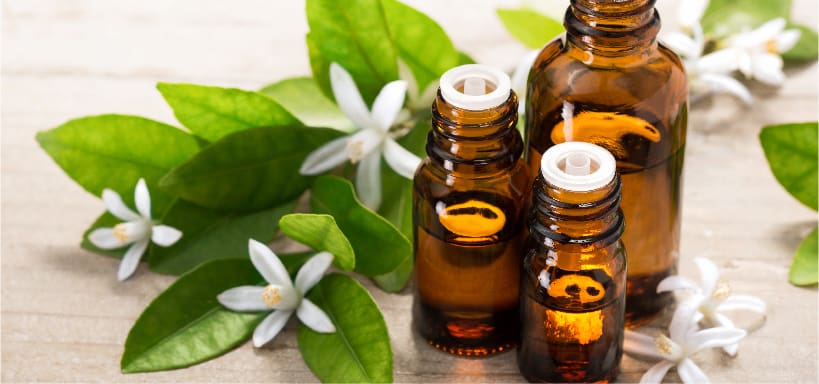What Is Neroli Oil?
The interesting thing about the bitter orange tree (Citrus aurantium) is that it actually produces three distinctly different essential oils. The peel of the nearly ripe fruit yields bitter orange oil while the leaves are the source of petitgrain essential oil. Last but certainly not least, neroli essential oil is steam-distilled from the small, white, waxy flowers of the tree.
The bitter orange tree is native to eastern Africa and tropical Asia, but today it’s also grown throughout the Mediterranean region and in the states of Florida and California. The trees bloom heavily in May, and under optimal growing conditions, a large bitter orange tree can produce up to 60 pounds of fresh flowers.
Timing is crucial when it comes to creating neroli essential oil since the flowers quickly lose their oil after they’re plucked from the tree. To keep the quality and quantity of neroli essential oil at their highest, the orange blossom must be handpicked without being excessively handled or bruised.
Some of the major components of neroli essential oil include linalool (28.5 percent), linalyl acetate (19.6 percent), nerolidol (9.1 percent), E-farnesol (9.1 percent), α-terpineol (4.9 percent) and limonene (4.6 percent).
Health Benefits
1. Lowers Inflammation & Pain
Neroli has been shown to be an effective and therapeutic choice for the management of pain and inflammation. Results of one study in the Journal of Natural Medicines suggest that neroli possesses biologically active constituents that have the ability to reduce acute inflammation and chronic inflammation even more so. It was also found that neroli essential oil has the ability to reduce central and peripheral sensitivity to pain.
2. Reduces Stress & Improve Symptoms of Menopause
The effects of inhaling neroli essential oil on menopausal symptoms, stress and estrogen in postmenopausal women were investigated in a 2014 study. Sixty-three healthy postmenopausal women were randomized to inhale 0.1 percent or 0.5 percent neroli oil, or almond oil (control), for five minutes twice daily for five days in the Korea University School of Nursing study.
Compared with the control group, the two neroli oil groups showed significantly lower diastolic blood pressure as well as improvements in pulse rate, serum cortisol levels and estrogen concentrations. The findings indicate that inhalation of neroli essential oil helps relieve menopausal symptoms, increase sexual desire and reduce blood pressure in postmenopausal women.
In general, neroli essential oil can be an effective intervention to reduce stress and improve the endocrine system.
3. Decreases Blood Pressure & Cortisol Levels
A study published in Evidence-Based Complementary and Alternative Medicine investigated the effects of using essential oil inhalation on blood pressure and salivary cortisol levels in 83 prehypertensive and hypertensive subjects at regular intervals for 24 hours. The experimental group was asked to inhale an essential oil blend that included lavender, ylang-ylang, marjoram and neroli. Meanwhile, the placebo group was asked to inhale an artificial fragrance for 24, and the control group received no treatment.
What do you think researchers found? The group that smelled the essential oil mix including neroli had significantly decreased systolic and diastolic blood pressure compared with the placebo group and the control group after treatment. The experimental group also showed significant decreases in the concentration of salivary cortisol.
It was concluded that the inhalation of neroli essential oil can have immediate and continuous positive effects on blood pressure and stress reduction.
Post time: Sep-15-2023



